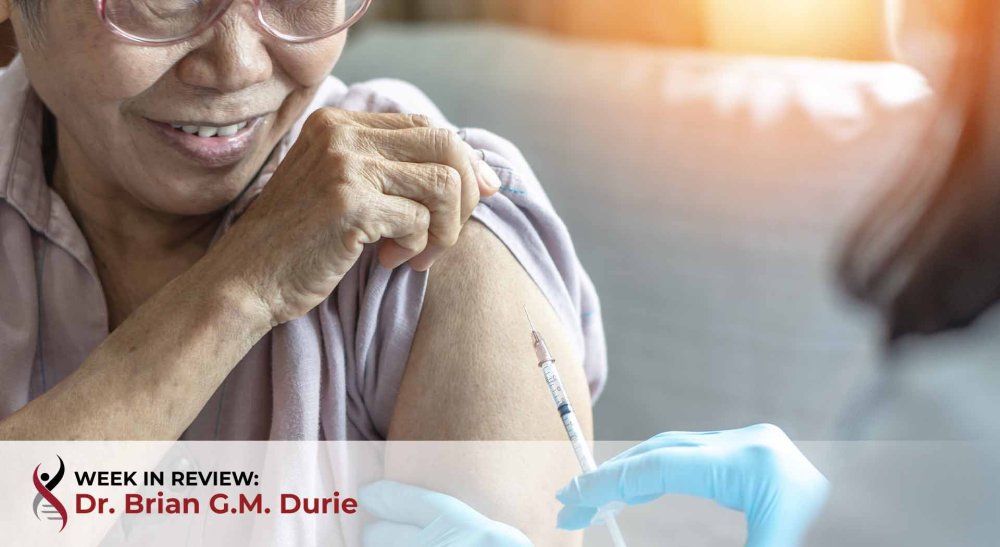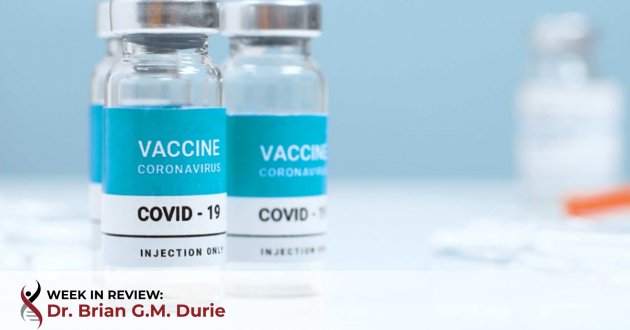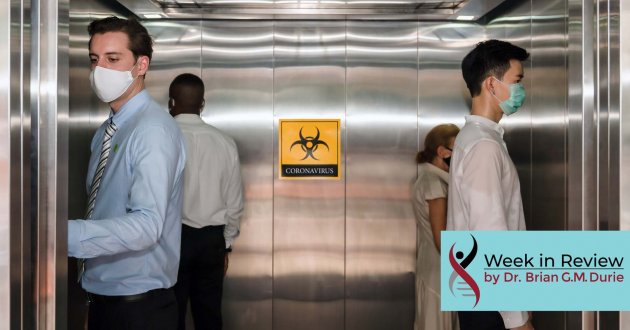On Friday, March 1, the Centers for Disease Control and Prevention (CDC) announced the release of updated recommendations on “how people can protect themselves and their communities from respiratory viruses, including COVID-19.”
According to CDC, “the new guidance brings a unified approach to addressing risks from a range of common respiratory viral illnesses, such as COVID-19, flu, and RSV, which can cause significant health impacts and strain on hospitals and health care workers. CDC is making updates to the recommendations now because the U.S. is seeing far fewer hospitalizations and deaths associated with COVID-19 and because we have more tools than ever to combat flu, COVID, and RSV.”
The CDC still provides active recommendations on core prevention steps and strategies:
- It is highly recommended that you stay up to date with your vaccination against respiratory viruses such as COVID-19, flu, and RSV if you are eligible.
- To prevent the spread of disease, practice good hygiene by covering coughs and sneezes, washing, and sanitizing your hands often, and cleaning frequently touched surfaces.
- Take active steps for cleaner air by bringing in more fresh outside air, purifying indoor air, or by gathering outdoors.
2024 COVID-19 Guidance
Although it seems that COVID-19 is less prominent in the news these days, it is still very much a cause for concern. Levels of infection continue to fluctuate in communities across the U.S. and episodes of COVID-19 have intermingled with influenza A, with some severe cases reported.
Testing is still essential in determining if your symptoms are brought about by the SARS-CoV-2 virus which causes COVID-19. Testing positive for the virus can be alarming; it is best to have a strategy in place in case that happens.
While the free home COVID-19 test program will be suspended by the U.S. government this coming Friday (March 8), it is still essential to have one on hand to determine if your symptoms are linked to COVID-19.
I would strongly advise ordering free COVID-19 tests before the deadline. Testing is key to having a correct diagnosis.
Guide to COVID-19 Symptoms in 2024
The New York Times recently published its 2024 Guide to COVID Symptoms and Treatment to provide an update on how to deal with COVID-19 in current times.
In general, symptoms of COVID-19 are now milder as compared to its onset in March 2020. However, the most common ones haven’t changed much since the beginning of the pandemic and are especially consistent in the dominant variant, JN.1, according to Cedars-Sinai Medical Center Associate Chief Medical Officer Dr. Soniya Gandhi.
Current symptoms of COVID-19 include fatigue, sore throat, congestion, runny nose, headache, body aches, and cough.
“All or any of those in isolation can still be COVID,” said Dr. Gandhi.
Less common symptoms may include conjunctivitis (or pink eye) and gastrointestinal issues such as nausea, vomiting, and diarrhea. Loss of taste and smell seem to be uncommon these days compared to earlier in the pandemic, when the Delta variant was the dominant strain.
Overall, COVID-19 symptoms are milder “because virtually everyone has some pre-existing immunity form vaccines, a prior infection, or both,” said the NY Times.
However, even if COVID-19 may have mild symptoms for most people, it can still present serious risks (sometimes, even fatal problems) for the elderly, the immunocompromised, those with health issues (such as heart disease, diabetes, or lung problems) as well as patients with active myeloma who are undergoing treatment.
According to recent data from the CDC, as of mid-February, over 21,000 people have been hospitalized with COVID-19, and roughly 10,000 COVID-19-related deaths have been reported in 2024.
Isolation, Treatment, and Care
If you test positive for COVID-19, general supportive care is the most important first step with plenty of rest and fluids as priority.
New CDC Isolation Guidelines
With regards to isolation period, the CDC has updated its guidance, recommending “that people stay home and away from others until at least 24 hours after both their symptoms are getting better overall, and they have not had a fever (and are not using fever-reducing medication). Note that depending on the length of symptoms, this period could be shorter, the same, or longer than the previous guidance for COVID-19.”
However, according to CDC, “it is important to note that the guidance doesn’t end with staying home and away from others when sick.”
CDC still “encourages added precaution over the next five days after time at home, away from others, is over.”
“Since some people remain contagious beyond the ‘stay-at-home’ period, a period of added precaution using prevention strategies, such as taking more steps for cleaner air, enhancing hygiene practices, wearing a well-fitting mask, keeping a distance from others, and/or getting tested for respiratory viruses can lower the chance of spreading respiratory viruses to others,” CDC adds.
Note that the CDC has a separate, specific guidance for healthcare settings. (COVID-19, flu, and general infection prevention and control) and Interim Guidance for Managing Healthcare Personnel with SARS-CoV-2 Infection or Exposure to SARS-CoV-2 that is not currently changing.
Antiviral Treatments
Paxlovid remains available under the U.S. Food and Drug Administration (FDA) Emergency Use Authorization (EUA) as an oral antiviral “for the treatment of mild-to-moderate COVID-19 in adults and children 12 years of age and older weighing at least 88 pounds (40 kg) who are at high risk for progression to severe COVID-19, including hospitalization or death.”
However, Paxlovid is not recommended for everyone as it may interact with some medicines and cause serious side effects. Talk to your healthcare provider about all the medicines you are taking (including prescription, over-the-counter medicines, vitamins, and herbal supplements).
Those with kidney problems may need a different dose. If you are pregnant or planning to become pregnant, or if you are breastfeeding, talk to your health provider as it is not known if Paxlovid can harm your unborn child or if it can be passed into your breastmilk.
If you are unable to take Paxlovid, remdesivir can be an option. However, remdesivir is taken intravenously and may not be readily available.
Unfortunately, Paxlovid is no longer free for everyone. The good news is, through December 31, 2024, individuals covered by Medicare or Medicaid as well as uninsured patients who are eligible for the USG Patient Assistance Program (PAP) can still avail of Paxlovid at no cost, according to the Administration for Strategic Preparedness & Response (ASPR) under the U.S. Department of Health and Human Services (HHS).
For more information on how to get COVID-19 antiviral treatments for free or at a lower cost, this AARP article might be a helpful resource.
Over-the-counter Medicines
If you have body aches or fever, acetaminophen or ibuprofen can be taken, along with plenty of fluids. Over-the-counter cold and flu medicines with decongestants or cough suppressants may also be taken but are not recommended as they may cause drowsiness. Pulse oximeters are readily available and recommended for use to monitor blood oxygen, if needed.
Seeking Medical Care
One of the things to closely watch out for is shortness of breath. If you find yourself taking quick and shallow breaths or if you have difficulty breathing seek immediate medical attention. Chest pain and confusion are also causes for immediate concern, seek emergency care right away when these occur.
Prolonged symptoms after several days or symptoms that improve but regress warrant further review by your doctor.
Long COVID and Brain Fog
Although most patients fully recover from COVID-19 in a span of days, there are those who experience long COVID (post-acute COVID-19 sequelae) or being infected with the SARS-CoV-2 virus for more than 12 weeks.
A recent study published in the New England Journal of Medicine conducted research on 800,000 adults where they were asked to complete an online assessment of cognitive function.
Findings revealed that those who experienced mild infections from COVID-19 had smaller cognitive and memory deficits as compared to those who experienced long COVID and had more pronounced “brain fog.” However, the study concluded that “longer-term persistence of cognitive deficits and any clinical implications remain uncertain.”
“Brain fog” consists of a number of difficulties including fatigue as well as short-term memory loss and the inability to reason and plan for day-to-day activities —more broadly described as cognitive decline. This is increasingly recognized and support/management groups are emerging to address this condition.
Additional Dose of Updated COVID-19 Vaccine Recommended for Older Adults
On February 28, CDC Director Mandy Cohen endorsed the recommendation of the CDC Advisory Committee on Immunization Practices (ACIP) for adults 65 years and older to receive an additional updated 2023-2024 COVID-19 vaccine this Spring.
Meanwhile, an updated COVID-19 vaccine shot is expected to become available in Fall 2024, about the same time when flu shots become available, according to CDC.
As always, I would recommend getting both COVID-19 and flu vaccines for your added protection and to avoid the risk of severe disease.
The Bottom Line
While we should be grateful that we have more tools to combat COVID-19, exercising caution is still STRONGLY advised. If you experience symptoms, get tested as soon as possible especially if you are at high-risk for severe disease.
The IMF is always ready to help. Get the latest information on COVID-19 for myeloma patients or contact the IMF InfoLine if you have questions by emailing infoline@myeloma.org or by calling 1-800-452 CURE (2873).
 Professor of Medicine, Hematologist/Oncologist, and Honoree MD at the University of Brussels, Dr. Brian G.M. Durie is Chairman Emeritus and Chief Scientific Officer of the IMF. Dr. Durie is also the Chairman of the International Myeloma Working Group (IMWG)—a consortium of more than 250 myeloma experts from around the world—and leads the IMF’s Black Swan Research Initiative® (BSRI).
Professor of Medicine, Hematologist/Oncologist, and Honoree MD at the University of Brussels, Dr. Brian G.M. Durie is Chairman Emeritus and Chief Scientific Officer of the IMF. Dr. Durie is also the Chairman of the International Myeloma Working Group (IMWG)—a consortium of more than 250 myeloma experts from around the world—and leads the IMF’s Black Swan Research Initiative® (BSRI). 






